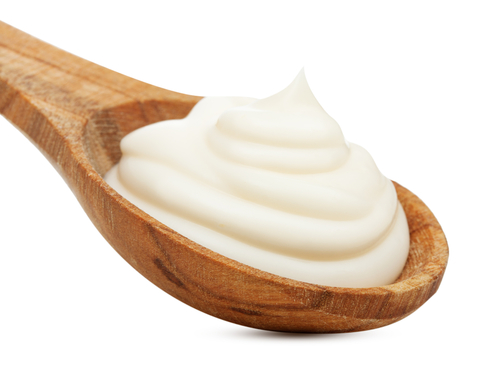Is Sour Cream Bad For You?
Short answer
There are various types of sour cream, so the benefits and risks will vary depending on the one you choose. That said, all sour cream can be harmful when overconsumed.
Recommended Alternative
More harmful than beneficial. Side effects are common, especially when consumed/done excessively. Moderation is very important.
View Full Grading System
Category 'A'
Very healthy and numerous health benefits. Side effects are rare. Things rated an 'A+' are typically necessary for survival (for example, water).
Very healthy and numerous health benefits. A few harmful qualities may be associated, but only under certain circumstances such as an allergic reaction.
Very healthy and numerous health benefits. Harmful qualities may be associated, but aren't usually serious.
It is important to note that even the best things in life can become bad in immoderate amounts. So, although something may be rated an 'A+', overconsumption/overdoing can bring unwanted effects.
Category 'B'
Very beneficial to your health. Things rated a 'B+' may have a few harmful qualities to pay attention to.
Overall beneficial to your health. Things rated a 'B' may have some harmful qualities to pay attention to.
More beneficial to your health than not. However, harmful qualities are most likely associated and shouldn't be overlooked.
The main difference between category 'A' and category 'B' is the harmful qualities typically present in 'B' items. Serious side effects are usually uncommon, but are still possible and should be taken note of.
Category 'C'
Both beneficial and harmful qualities associated. Things rated a 'C+' are typically a bit more on the beneficial side. Still, moderation is important.
A fairly even ratio of beneficial and harmful qualities. Moderation is important. Very general topics that can lean towards both sides of the spectrum will be placed here as well. Rice, for example, can be good or bad depending on the type.
More harmful than beneficial. Side effects are common, especially when consumed/done excessively. Moderation is very important.
Category 'C' usually denotes to both good and bad qualities. When it comes to this category, it is important to keep this word in mind: moderation.
Category 'D'
Harmful to your health. Although benefits may be associated, the bad most likely outweighs the good. Moderation is very important.
Harmful to your health. A few benefits may be associated, but the bad outweighs the good. Moderation is extremely important.
Harmful to your health. Very few, if any, benefits are present. Things in this category should be avoided as much as possible.
Category 'D' is typically for things that are more harmful than beneficial. While consuming/doing something unhealthy once in a blue moon shouldn't hurt, we definitely recommend eliminating 'D' items as a regular part of your routine/diet.
Category 'F'
Category 'F' is for things that fail to bring anything beneficial to the table, and are very harmful to your health. We recommend completely avoiding anything in this category. Long-term side effects of 'F' items are usually very serious.
Category 'N'
'N' stands for neutral. Things placed into this category are generally (a) neither good nor bad for you, or (b) lack the necessary evidence to reach any conclusions.
Long answer
Sour cream is very popular with a wide variety of dishes. It is made from cream that contains lactic acid bacteria (which gives it its flavor). People looking to eat sour cream can choose from full-fat, reduced –fat, and fat-free sour cream. A quick caveat: fat-free does not mean “contains no fat” but rather “for every 50g of sour cream, there is less than 0.5g of fat.” Those opting for the flavorful option of full-fat sour cream should be aware of the potentially harmful side effects of consuming too much.
In just one tablespoon of full-fat sour cream, there are 23 calories. Calories from fat constitute over 90% of the total caloric amount, with approximately 60% of the fat coming from saturated fat. Saturated fat is a “bad” fat and is responsible for increasing the levels of cholesterol in the blood stream thereby leading to an increased risk of heart disease. Even eating fat-free sour cream is not completely safe, as it contains tyramine, which has been linked to migraines and irritable bowel syndrome. Also, the artificial gums used in fat-free sour cream to improve the flavor may lead to digestive problems such as feeling bloated or gassy.
The positive side to sour cream is that it is high in vital nutrients such as sodium, phosphorus, and Vitamin B. There are also many other nutrients found in sour cream, e.g. potassium, iron, etc. However, the amount of most of these is negligible and for the ones found in any significant quantity, there are healthier alternatives to sour cream that provide the same nutritional benefits. For example, whereas a ½ cup of sour cream provides 6% of the recommended amount of Vitamin B, just having a 1/3 cup of whole grain cereal will give you 100% the amount of Vitamin B your body needs per day.
Possible short-term side effects
Possible long-term side effects
- increased blood pressure
-
increased cholesterol
-
heart disease
-
weight gain
Ingredients to be aware of
- saturated fat
-
tyramine
-
artificial gums
-
lactic acid bacteria
-
excess calories
Benefits
Healthier alternatives
Our Wellness Pick
(what is this?)
Only Plant Based Sour Cream
- Vegan-friendly
- Convenient squeeze bottle
- Shelf-stable product
- Dairy-free alternative
Learn More!
Please turn your Ad Blocker off to see this content. Thank you!
Thank you for your feedback!
Written by Jeff Volling
Published on: 12-29-2015
Last updated: 12-15-2023
Thank you for your feedback!
Written by Jeff Volling
Published on: 12-29-2015
Last updated: 12-15-2023

 Approved by
Approved by 















